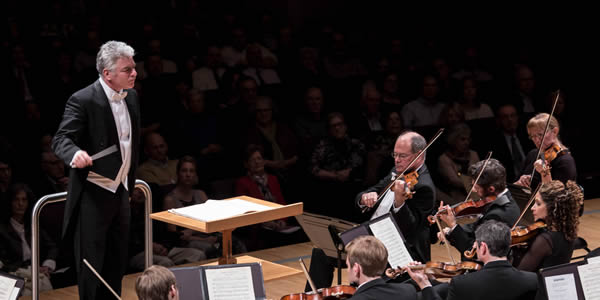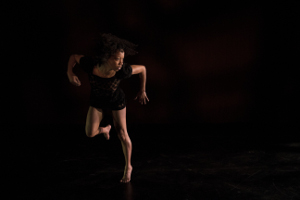This preview has been provided by the North Carolina Symphony.
The North Carolina Symphony’s Northern Lights program is one that Music Director Grant Llewellyn is especially passionate about this season. Llewellyn, who spends several weeks in Finland every year, has an affinity for the country’s best-known composer, Sibelius, and his greatest successor, Rautavaara. He will lead NCS in exquisite works by the two Finnish composers on October 6 at Meymandi Concert Hall in downtown Raleigh.
For the first time in its history, NCS will perform Sibelius’ tone poem En Saga, an intensely personal musical statement of which the composer wrote, “It is an expression of a certain soul state … in no other work have I revealed myself so completely.”
Llewellyn draws parallels between En Saga and the Finnish landscape that he has come to appreciate so much during his travels. “The light and the climate are just beautiful,” he says. “It takes time to absorb it — so, too, in the music. You have to give it space and time to evolve. There’s something titanic about that country and Sibelius has captured it memorably in his music.”
In his Symphony No. 2, Sibelius captured the political climate of his country, even if unintentionally. A strong sense of nationalism had swept over Finland when the symphony was premiered in 1902, and with its optimistic mood and blazingly affirmative conclusion, the public eagerly latched onto it as a patriotic missive — yet Sibelius himself never described it that way. Instead, the composer called his breathtakingly beautiful symphony “a confession of the soul.”
Just like Llewellyn, NCS musicians equate Sibelius’ music with the natural beauty of Finland. “I love playing Sibelius — it makes me feel like I’m standing in the cold, Arctic winds of Scandinavia,” says Anne Whaley Laney, Principal Flute. “The build-up in the last movement of his Symphony No. 2 is like the icy sea rolling and churning, finally breaking forth into a sunlit bay.”
“Whenever I hear Sibelius’ beautiful, expansive music, I picture images of his native Finland,” adds violinist Emily Glover. “I’m sure the audience will enjoy sitting back and letting Sibelius take them on a journey to his homeland.”
Similarly, Llewellyn asserts that Apotheosis by Einojuhani Rautavaara “takes you into the extraordinary sound world that is Finland.” Rautavaara, who died in 2016, is generally considered to be the finest Finnish composer since Sibelius Llewellyn agrees that he “took up the mantle in the sheer scope of imagination that he brings to his orchestrations.” The tender tone poem Apotheosis is one of his most popular works, with warm, sumptuous harmonies.
Audience members are invited to learn more about the music of Sibelius and Rautavaara at a free pre-concert talk at 7pm in the Swalin Lobby of Meymandi Concert Hall.
North Carolina Symphony
Northern Lights
Friday, October 6 at 8pm (pre-concert talk at 7pm)
Meymandi Concert Hall
Duke Energy Center for the Performing Arts (Raleigh)
PERFORMERS
North Carolina Symphony
Grant Llewellyn, conductor
PROGRAM
Sibelius: En Saga
Rautavaara: Apotheosis
Sibelius: Symphony No. 2
TICKETS START AT $18
Online: ncsymphony.org (TicketMaster fees apply)
By phone: 919.733.2750 ($8 processing fee applies)
In-person: NCS State Headquarters, 3700 Glenwood Ave., Suite 130, Raleigh (No processing fee)
About the North Carolina Symphony
Founded in 1932, the North Carolina Symphony (NCS) is a vital and honored component of North Carolina’s cultural life. Its 180 concerts and 120 community engagement events annually are greeted with enthusiasm by adults and schoolchildren in more than 90 North Carolina counties — in communities large and small, and in concert halls, auditoriums, gymnasiums, restaurants, clubs, and outdoor settings. The Symphony’s full-time professional musicians perform under the artistic leadership of Music Director Grant Llewellyn.
NCS’s state headquarters venue is the spectacular Meymandi Concert Hall at the Duke Energy Center for the Performing Arts in downtown Raleigh. The Symphony’s service across the state includes series in Chapel Hill, Fayetteville, New Bern, Southern Pines, and Wilmington, as well as the Summerfest series at its summer home, the outdoor Koka Booth Amphitheatre in Cary. NCS brings some of the world’s greatest talents to North Carolina and embraces home-state artists from classical musicians to bluegrass bands, creating live music experiences distinctive to North Carolina.
Committed to engaging students of all ages across North Carolina, NCS leads the most extensive education program of any symphony orchestra — serving nearly 70,000 students each year. In alignment with the curriculum set by the North Carolina Department of Public Instruction, the Symphony provides training and resources for teachers, sends small ensembles into classrooms, and presents full-orchestra Education Concerts that bring the fundamentals of music to life. Music Discovery for preschoolers combines music with storytelling, and at the middle and high school levels, students have opportunities to work directly with NCS artists and perform for NCS audiences.
NCS is dedicated to giving voice to new art, and has presented 47 U.S. or world premieres in its history. In March 2017, NCS appeared at The John F. Kennedy Center for the Performing Arts in Washington, D.C., as one of four orchestras chosen for the inaugural year of SHIFT: A Festival of American Orchestras — an honor that recognized the Symphony’s creative programming and innovative community partnerships.
The first state-supported symphony in the country, NCS performs under the auspices of the North Carolina Department of Natural and Cultural Resources. To learn more, visit ncsymphony.org.












